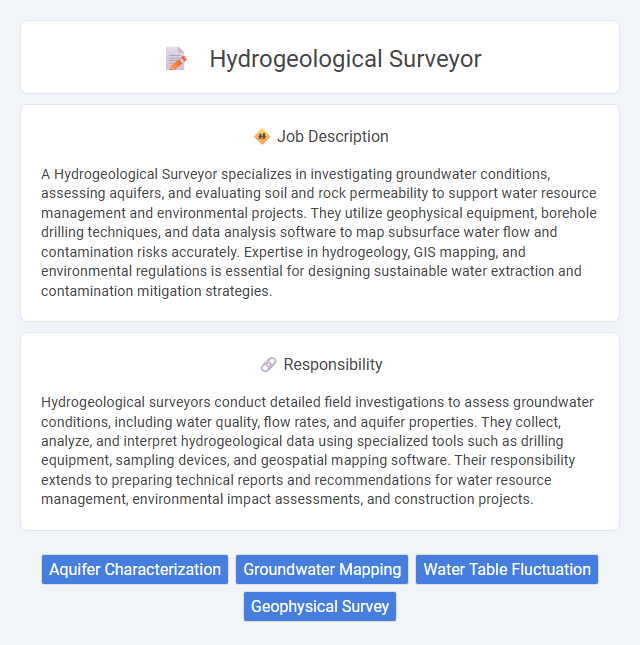
A Hydrogeological Surveyor specializes in investigating groundwater conditions, assessing aquifers, and evaluating soil and rock permeability to support water resource management and environmental projects. They utilize geophysical equipment, borehole drilling techniques, and data analysis software to map subsurface water flow and contamination risks accurately. Expertise in hydrogeology, GIS mapping, and environmental regulations is essential for designing sustainable water extraction and contamination mitigation strategies.
Individuals with strong analytical skills and a keen interest in geology and environmental sciences are likely suitable for a hydrogeological surveyor role. Those who are comfortable working outdoors in varied weather conditions and possess good problem-solving abilities may find this job fitting. People who prefer routine office work or have limited physical stamina might face challenges in adapting to the demands of this profession.
Qualification
A Hydrogeological Surveyor must possess a strong background in geology, hydrology, or environmental science, typically requiring a bachelor's degree in one of these fields. Proficiency in geographic information systems (GIS), groundwater modeling software, and accurate data collection methods is essential for effective site analysis and resource assessment. Certifications such as Professional Geologist (PG) or Certified Hydrogeologist enhance credibility and career advancement in hydrogeological surveying roles.
Responsibility
Hydrogeological surveyors conduct detailed field investigations to assess groundwater conditions, including water quality, flow rates, and aquifer properties. They collect, analyze, and interpret hydrogeological data using specialized tools such as drilling equipment, sampling devices, and geospatial mapping software. Their responsibility extends to preparing technical reports and recommendations for water resource management, environmental impact assessments, and construction projects.
Benefit
A Hydrogeological Surveyor likely offers valuable insights into groundwater conditions, enhancing water resource management and environmental conservation. The role probably provides opportunities for fieldwork and use of advanced geospatial technologies, which may contribute to professional growth and technical skill enhancement. Employment in this field could also lead to involvement in crucial infrastructure projects, increasing job stability and influence on public health and safety.
Challenge
Hydrogeological surveyors likely face challenges related to accurately assessing groundwater conditions in diverse and often unpredictable environmental settings. The complexity of subsurface geology and variability in water quality measurements might require advanced analytical techniques and problem-solving skills. Managing fieldwork logistics and ensuring data reliability under variable weather conditions could also pose significant obstacles.
Career Advancement
Hydrogeological surveyors specializing in groundwater assessment and environmental impact analysis benefit from career advancement through gaining expertise in geospatial technologies and hydrological modeling software. Progression opportunities include roles such as senior hydrogeologist, project manager, or environmental consultant within engineering firms, environmental agencies, and government bodies. Continuous professional development and certifications in hydrogeology and GIS enhance prospects for leading complex groundwater resource management and contamination remediation projects.
Key Terms
Aquifer Characterization
Hydrogeological surveyors specializing in aquifer characterization utilize advanced geophysical techniques and well-logging methods to assess groundwater availability, quality, and flow dynamics. They analyze soil permeability, porosity, and hydrostratigraphic units to map aquifer extents and recharge zones accurately. Their expertise supports sustainable water resource management and contamination risk assessment crucial for environmental and engineering projects.
Groundwater Mapping
Hydrogeological Surveyors specialize in groundwater mapping by identifying and analyzing aquifer locations and water table depths through geophysical methods and field sampling. They utilize advanced GIS technology and hydrogeological models to generate accurate spatial representations of subsurface water resources. Their expertise supports sustainable water resource management, environmental impact assessments, and groundwater contamination studies.
Water Table Fluctuation
Hydrogeological surveyors specialize in monitoring and analyzing water table fluctuations to assess groundwater availability and quality. They use techniques such as borehole drilling, geophysical surveys, and piezometer installation to collect precise data on seasonal and long-term changes in groundwater levels. Accurate measurement of water table fluctuations is critical for sustainable water resource management, contamination risk assessment, and environmental impact studies.
Geophysical Survey
Hydrogeological Surveyors specializing in geophysical surveys use advanced techniques such as electrical resistivity, seismic refraction, and ground-penetrating radar to map underground water resources and geological formations. Their expertise enables accurate identification of aquifers, subsurface geology, and potential contamination zones, essential for sustainable water resource management and environmental protection. Proficiency in data interpretation and GIS integration enhances the precision and efficiency of hydrogeological investigations.
 kuljobs.com
kuljobs.com